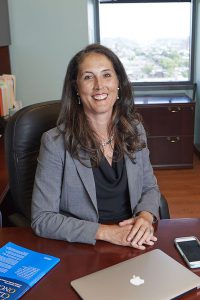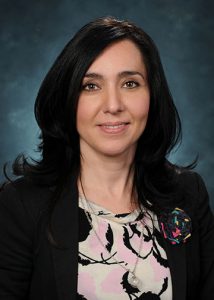Party with a Purpose Joins AACR to Support Prostate Cancer Research
For the third year running, the American Association for Cancer Research (AACR) has been selected as the beneficiary of the 18th annual Party with a Purpose, a cause-driven gala in Philadelphia that supports lifesaving cancer research. Funds raised at this year’s event will be dedicated to research focused on prostate cancer. This common cancer is estimated to affect nearly 165,000 men in 2018, according to recent statistics.
At the gala, to be held on Oct. 28, Karen Knudsen, PhD, Enterprise Director of the Sidney Kimmel Cancer Center at Jefferson, will receive the 2018 Scientific Achievement Award. She has chosen Veronica Rodriguez-Bravo, PhD, assistant professor and colleague at the Sidney Kimmel Cancer Center at Jefferson to receive the Early Career Investigator Award.
In a recent interview, both Knudsen and Rodriguez-Bravo talked about progress and challenges in the field of prostate cancer, and they provided perspectives on how basic science research can help shape patient care.
Dr. Knudsen, can you please tell us about what this Scientific Achievement Award means to you, and why you selected Dr. Rodriguez-Bravo to receive this year’s grant award?
This Scientific Achievement Award is such an honor – I feel humbled by it, especially knowing who has been honored in the past, and I’m just thrilled to pieces. This is also a recognition for a large number of trainees who came through the laboratory and helped us bring those basic science concepts into the clinical setting. I’m so proud of the work that they’ve done, and to me, this is an honor for all of us.
I selected Dr. Rodriguez-Bravo for this award for the same reason that we were so keen to recruit her to the Sidney Kimmel Cancer Center at Jefferson. She embodies everything that we look for in a new faculty member. We wanted someone who had the ability to think outside the box to come up with new ways to target advanced prostate cancer. She has a very fresh approach, and she’s been just delightful to watch as a young investigator as she builds her team. She’s an exceptional mentor, and I have every confidence that she will to continue to make the kind of seminal discoveries that she has already made in this field.
We’re both thankful to the AACR for these awards. In addition to giving recognition that’s due to our labs and to Dr. Rodriguez-Bravo, I hope that this continues to bring awareness to the importance of providing resources to basic science research, and underscores the importance of focusing on prostate cancer, a cancer type that has such unmet need. This is an area where we can – and need – to do better in terms of finding new ways to treat patients and give them a better quality of life.
How did you choose to focus on prostate cancer research?
Rodriguez-Bravo: I started my career as a cancer cell biologist, and during my studies on basic mechanisms, I investigated some of the targeted therapeutics used today for the treatment of prostate cancer, such as drugs that target cell division. I was very interested in understanding how prostate cancer cells respond and acquire resistance to these drugs. I started collaborating with researchers in the field, became fascinated with the topic, and wanted to learn more about the evolution of prostate cancer. Now my entire lab is devoted to prostate cancer research.
Knudsen: At the beginning of my training, I helped discover some of the pathways that control cell division. For my fellowship, I wanted to apply that knowledge to cancer research, and I joined the lab of Dr. Webster Cavenee, who happened to be President of the AACR at that time, and who had a really robust brain tumor group. When I walked into his office on that first day, he told me that he’d like to start a new group that focused on an area of unmet clinical need, and we decided that this new group should focus on prostate cancer. During my fellowship, we uncovered how hormones regulate cell division and cell proliferation in prostate cancer, and that work inspired me to test these concepts in the clinic. I still have an incredible passion for studying prostate cancer, because one of my major goals is to reduce the burden from cancer, both in the U.S. and worldwide.
Talk a bit about your work in the field, and how your basic science research can be translated into patient care.
Rodriguez-Bravo: My basic research is centered on mechanisms that regulate the transfer of molecules in and out of the nucleus through complexes known as nuclear pores. These mechanisms are important for regulating gene expression, and we are trying to understand how these processes that support the stability of the genome drive prostate cancer. Understanding these underlying mechanisms can help identify new targets and develop novel prostate cancer therapeutics.
Knudsen: We have a few different interests in my lab, and they all emanate from the clinical disease. Even though prostate cancer is a relatively common cancer – it’s the second leading cause of cancer death amongst men – it has a lot of uncommon things about it. For starters, prostate cancer is largely not responsive to chemotherapeutics or antimitotic agents. This cancer is, however, responsive to hormone ablation. Prostate cancer is addicted to hormone signaling, and our lab has been very interested in studying that process – what is so special about testosterone, which is ubiquitous, and how are hormones driving the growth and progression of prostate cancer?
In my lab, we’ve made basic science discoveries in understanding the transcriptional networks downstream of hormone action; we’ve identified the connection between androgen receptors and DNA repair; and we’ve advanced the understanding of how genetic alterations in these pathways drive prostate cancer progression. In all three lines of investigation, we’ve been lucky enough to take some of these observations and move them into the clinical setting.
In recent years, what are some of the most exciting advances that we’ve seen in prostate cancer research?
Rodriguez-Bravo: From a basic science perspective – which also has a huge impact down the line for patient care – we have seen an explosion in the amount of genomic data from prostate cancer. This year, virtually every month, there has been a high-impact article published that describes how tumors behave and what key proteins are translated, based on genomic data from large tumor databases. As a scientist early in my career, this is a very powerful research tool that allows us to move our research forward.
Knudsen: Another aspect that complements these genome-wide discoveries is the explosion in new agents that are life-extending in this disease. Not so long ago, we had just a small armament of therapeutics for prostate cancer – we could prescribe agents that worked to deplete hormones; we had a first-generation androgen receptor antagonist; we could offer a very short course of chemotherapy, which at best gave patients about a three-month benefit. We really struggled as a field for a long time in terms of efficacious treatment options. Now, it’s an unprecedented time in prostate cancer. Today, we have two second-generation androgen receptor antagonists that have been shown to be life-extending; we have better hormone-depleting agents for patients who do not respond to first-line hormone therapy; and we’re smarter and better about how to use chemotherapies. Additionally, we’ve discovered that targeting hormone-DNA repair crosstalk can be a key component of treatment, and I think this therapeutic strategy will become standard of care in the future.
What are some of the biggest challenges in the field?
Rodriguez-Bravo: Because I’m interested in studying advanced disease, the ideal specimen comes from metastatic samples. While primary tumor samples are abundant, access to metastatic samples in prostate cancer presents a huge challenge. We are trying to work around this limitation by using newer methodologies, such as liquid biopsies, to collect circulating tumor cells from metastatic patients.
Knudsen: I think there are major challenges on both the basic science side and the clinical side. One major challenge in clinical care is that we are still unable to treat metastatic disease. Another major challenge is that immunotherapy doesn’t work particularly well in prostate cancer. This is in part because we don’t have robust models that mimic human disease and the tumor microenvironment. Furthermore, we don’t have defined clinical subtypes in prostate cancer; we still treat all patients as if they had the same disease. Another challenge is the uncertainty around which patients need to be on active surveillance and which patients need treatment.
Right here in Philadelphia, we have some of the greatest cancer disparities for prostate cancer in the nation – the incidence and mortality rates are exceptionally high compared to other large urban cities. I think this comes down to how we can better identify risk, including genetic risk. One thing that we’re very proud of here in this city is that we held the first consensus conference discussing the genetics of prostate cancer risk. Experts convened in Philadelphia in 2017 to write the first consensus paper that can help identify men at risk, and those potentially needing more aggressive screening.
Dr. Rodriguez-Bravo, how will the funding from the Early Career Investigator award help you advance your research?
These days, every piece of funding is essential, especially as an early-career scientist. Obtaining funding is not only challenging, but also time-consuming. This grant is crucial for my new lab to produce data that can move the research forward. This will also help us to apply for a clinical grant in the near future and provide us with the opportunity to translate the research findings into better outcomes for prostate cancer patients.
As an immigrant to the United States, the opportunity to come here, to conduct research, and to receive an award that furthers my passion – I have no words. I feel completely overwhelmed, and I’m extremely lucky to be in this position. I am very honored by this award, and very thankful to Dr. Knudsen and the AACR.
More information about this year’s event can be found here. Here’s a video featuring Drs. Knudsen and Rodriguez-Bravo.
https://www.facebook.com/AACRPartyWithAPurpose/videos/452815221920474/





